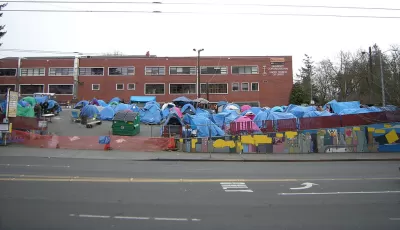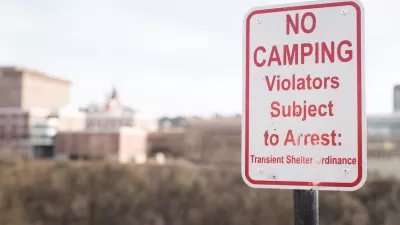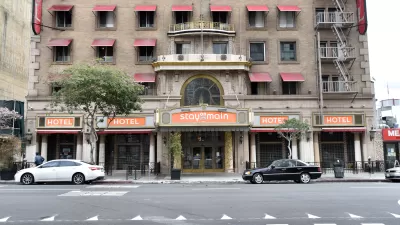New numbers from the U.S. Department of Housing and Urban Development show "devastating" growth in the number of unhoused people in the United States in January 2020.

According to new numbers from the U.S. Department of Housing and Urban Development (HUD), the growth in homelessness in 2020 was already having "devastating" effects even before the pandemic struck. Pam Fessler reports for NPR on HUD's annual Point-in-Time (PIT) count, "a count of sheltered and unsheltered people experiencing homelessness on a single night in January" mandated by the agency and conducted through local organizations. "On a single night in January 2020, there were more than 580,000 individuals who were homeless in the United States," up 2% from 2019.
Conditions for those living without permanent housing have also deteriorated. "For the first time since the government began doing the annual count, the number of single adults living outside — 209,413 — exceeded the number of individuals living in shelters — 199,478." The housing crisis has continued to have a disproportionate impact on communities of color, Fessler reports. "As has been the case for years, a disproportionate share of those experiencing homelessness were Black — about 39% of the total, though African Americans make up about 13% of the nation's overall population. Twenty-three percent of those who were homeless last year identified as Hispanic or Latino."
While the impact of the pandemic is expected to deepen the crisis, data for 2021 will be incomplete as HUD has agreed to exempt some localities from the PIT count to ensure the safety of volunteers. Advocates hope new federal assistance can help curb the crisis. The COVID relief bill passed by Congress "provides $5 billion in homelessness assistance, more than $20 billion in emergency rental aid and $5 billion in new housing vouchers."
FULL STORY: HUD: Growth Of Homelessness During 2020 Was 'Devastating,' Even Before The Pandemic

Planetizen Federal Action Tracker
A weekly monitor of how Trump’s orders and actions are impacting planners and planning in America.

Maui's Vacation Rental Debate Turns Ugly
Verbal attacks, misinformation campaigns and fistfights plague a high-stakes debate to convert thousands of vacation rentals into long-term housing.

Restaurant Patios Were a Pandemic Win — Why Were They so Hard to Keep?
Social distancing requirements and changes in travel patterns prompted cities to pilot new uses for street and sidewalk space. Then it got complicated.

In California Battle of Housing vs. Environment, Housing Just Won
A new state law significantly limits the power of CEQA, an environmental review law that served as a powerful tool for blocking new development.

Boulder Eliminates Parking Minimums Citywide
Officials estimate the cost of building a single underground parking space at up to $100,000.

Orange County, Florida Adopts Largest US “Sprawl Repair” Code
The ‘Orange Code’ seeks to rectify decades of sprawl-inducing, car-oriented development.
Urban Design for Planners 1: Software Tools
This six-course series explores essential urban design concepts using open source software and equips planners with the tools they need to participate fully in the urban design process.
Planning for Universal Design
Learn the tools for implementing Universal Design in planning regulations.
Heyer Gruel & Associates PA
JM Goldson LLC
Custer County Colorado
City of Camden Redevelopment Agency
City of Astoria
Transportation Research & Education Center (TREC) at Portland State University
Jefferson Parish Government
Camden Redevelopment Agency
City of Claremont





























